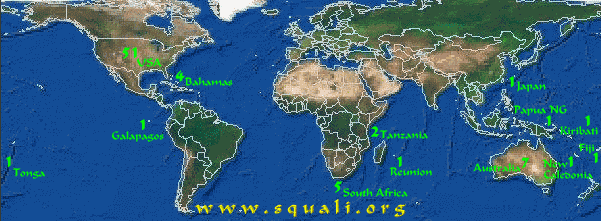
Report of 2000 - 79 shark attacks
79 unprovoked shark attacks were reported last year, the largest number since the International Shark Attack File began compiling statistics in 1958.
Despite the higher incidence, the number of people who died from shark attack wounds last year was 10, fewer than the 1990s decade average of 12.7, the report said.
Last year, an upswing of attacks in Florida and the United States was largely responsible for the worldwide increase, the university said. Fifty-eight attacks were recorded around the globe in 1999 and the yearly average during the 1990s was 54.
Three people were killed in Australia, Black Point (september), Cactus Beach (september) and Cottesloe Beach (november), two in Tanzania (local said 5 !!!) at Coco Beach (september !!), one each in New Caledonia, Japan in Miyako Island (september), Fiji in Taveuni (dicember), Papua New Guinea near Madang (may), United States in St. Pete Beach (august).
Researchers said more people were spending more time in the water in exotic locales such as Fiji, Ecuador's Galapagos Islands, Reunion Island in the Indian Ocean and the tiny Pacific Ocean island of Kiribati.
"Attacks are basically an odds game based on how many hours you are in the water," ISAF director George Burgess said. "Some of the attacks are beginning to pop up in far-flung corners of the earth as tourists can afford to vacation in areas they would not normally have gone to in the past."
Tourists are more vulnerable to shark attacks because they lack the local knowledge of where not to swim.
Shark attacks also are more frequently recorded now because of news on the Internet and victims taking the initiative to report incidents by e-mail, researchers said.
The ISAF recorded 51 attacks in the United States in 2000, up from 37 a year earlier. Thirty-four of those were in Florida, up from 25 in 1999.
Australia had 7 reported attacks, South Africa 5, the Bahamas 4 and Reunion Island, Papua New Guinea and Tanzania 2 each. Single incidents were reported in Fiji, the Galapagos, Japan, Kiribati, New Caledonia and Tonga.
